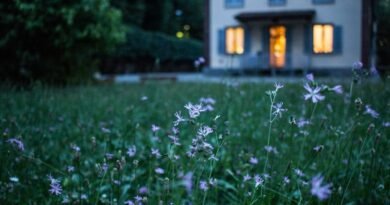11 Easy Tricks to Keep Wasps Away From Your Home and Yard This Season
Daniel Guntrip / Getty Images
Like bees and butterflies, wasps are pollinators—so they can be good bugs to have around. But unlike these other insects, wasps can sting multiple times, and under the right circumstances, they tend to be a bit more aggressive and protective of their nests.
Fortunately, there are several ways to deter wasps from your yard, garden, patio, and other outdoor spaces. We chatted with experts to discover the best ways to keep wasps away, so you can actually enjoy your time in your space.
Meet the Experts
Michael Clarke is a landscape architect, horticulturalist, and founder of Yardwork.Dr. Jim Fredericks is chief entomologist and senior vice president of public affairs for the National Pest Management Association (NPMA).Kyle Selbach is the director of operations at All U Need Pest Control.
Remove Leftover Food and Drinks
Though pollinators, wasps are attracted to sweet-smelling food left behind after a backyard bbq.
According to Michael Clarke, landscape architect, horticulturalist, and founder of Yardwork, this is because wasps require high-energy foods that can sustain their fast metabolism.
Hence you are likely to find a wasp sniffing around an open soda can or bottle of fruit juice.
“It’s best to ensure that all foods, especially sweet foods and drinks are picked up and disposed of after a meal,” he says.
Want more gardening tips? Sign up for our free gardening newsletter for our best-growing tips, troubleshooting hacks, and more!
Rinse Out Recyclables Before Placing Them in the Bin
Cover your recyclables bin with a lid, but also be sure to properly dispose of your cans, plastics, and aluminum. “
This means rinsing out recyclable bottles and cans before tossing them in the bin, as stinging insects are attracted to liquids that are left behind,” Dr. Jim Fredericks, chief entomologist and senior vice president of public affairs for the National Pest Management Association (NPMA).
Cover and Fill Holes in the Ground
Some types of wasps will move into a home another animal has abandoned. This is the case with yellow jackets, which will often create large underground nests in abandoned gopher or mole holes, Clarke says.
Clarke explains how fertile females will often set their nests up in these inactive holes when spring comes. Thus, to make these spaces less inviting to yellow jackets, fill any open yard holes on your property to deter wasps from moving in.
Regularly Check Your Property for Wasp Nests
Look for signs of wasp activity in the form of nests around your house. Dr. Fredericks recommends walking around your home’s exterior and paying close attention to overhangs, eaves, picnic tables, the underside of porches, and decks for nests routinely. If you find nests, do not try to remove them on your own.
“Stinging insects are protective of their nests and will attack if they feel threatened or are disturbed,” he says. Instead, contact a licensed pest control professional.
Get Rid of Leaf Litter
One of the best things you can do to deter wasps is to keep up with your yard maintenance. According to Kyle Selbach, director of operations at All U Need Pest Control, this means getting rid of leaf litter and overgrown trees.
If you want to keep most of your leaf litter, try relocating them to other areas.
“If there is a bunch of fallen leaves and piles of leaves, this gives wasps just one more place to make a home,” Selbach says.
Use Peppermint Oil
Wasps hate the smell of peppermint oil, making it a great natural deterrent against wasps.
“If you see wasps congregating in an area of your yard, you can take a cotton ball soaked in peppermint oil and place it near these areas or spray a mixture of water and peppermint oil to
keep them away,” Clarke says.
Another approach is planting peppermint or mint plants in areas you want wasps not to be in, as these plants offer scents that wasps don’t like.
Make Sure Your Trash Is Covered
Just like how you want to keep open sugary foods and drinks out of reach, you also want to make sure the trash is properly sealed and covered. Trash will be more likely to host containers of sweet-smelling food and drinks, so all the more reason to keep the trash lids closed.
“Sanitization is key to preventing almost every single pest, including wasps,” Selbach says. “Not allowing them to have food and a breeding ground, will always be your best bet.”
Closing your trash will also deter roaches, ants, flies, and other common pests.
Seal Any Access Points Into Your Home
Close doors and windows, or if you would like these to remain open to increase indoor air flow, place screens on them. Wasps can also find their way into your house through tears in window screens, or openings in vents, fascia boards, siding, or holes in stucco, Clarke explains.
“Be sure to walk around your home and look for any small openings that a wasp can enter and create a nest in,” Clarke recommends
If you find any openings, fill them or cover them with the appropriate materials.
Get Rid of Spiders
House spiders are good insects, dining on flies, and other unwanted household bugs. But believe
it or not, some wasps, such as mud dauber wasps, use spiders as prey.
“Mud daubers like to bring spiders into their egg sacs or mud tubes to leave as a food source,” Selbach explains.
While removing all spiders is impossible, you can reduce the number of spiders near your porch or entryways where wasps might also try to set up shop.
Add a Lanai or Screened Porch
If you like sitting outside but don’t want the bugs, adding a lanai or screened porch makes sense. Selbach explains how these physical barriers will help protect you when you’re hanging around the backyard. With the screens in place, wasps won’t be able to fly around or sting you.
Fill Any Cracks in Your Home’s Exterior
Seal cracks and crevices in your house’s exterior with an appropriate sealant. According to Dr. Fredericks, yellow jackets are known to build nests inside wall voids in buildings, so it’s vital to eliminate any entry points to reduce the likelihood of a nest getting built.
Also be sure to fill any holes or cracks in other structures, like garden sheds and standalone garages as well.
Frequently Asked Questions
Is there a natural deterrent for wasps?
Aside from covering trash and preventing wasps from making nests, the most effective natural deterrent for wasps is planting herbs like mint or using peppermint oil to help keep wasps away.
What attracts wasps the most?
Sugary foods and drinks. According to Dr. Fredericks, wasps are also on the lookout for proteins.
“In the early summer months, wasps and hornets are especially attracted to protein sources, because they are feeding their larvae a protein-rich diet to build the colony,” he says.
But by fall, the hornets will switch to a more carbohydrate-rich (or sweet) diet to gather energy for growing colonies.
What can I spray to prevent wasps?
According to Clarke, you can spray a mixture of water and peppermint oil to deter wasps.
Read the original article on The Spruce.
The Spruce Latest Stories

:max_bytes(150000):strip_icc():format(jpeg)/GettyImages-987374008-bb6c3c93aab643d2bb57cca160359825.jpg)
:max_bytes(150000):strip_icc():format(jpeg)/Home-front-yard-102792895_BRWjI85-aLG8ZMEyZN7WNi-61d9adfabae34e8bb8918cbfdc81f558.jpg)

